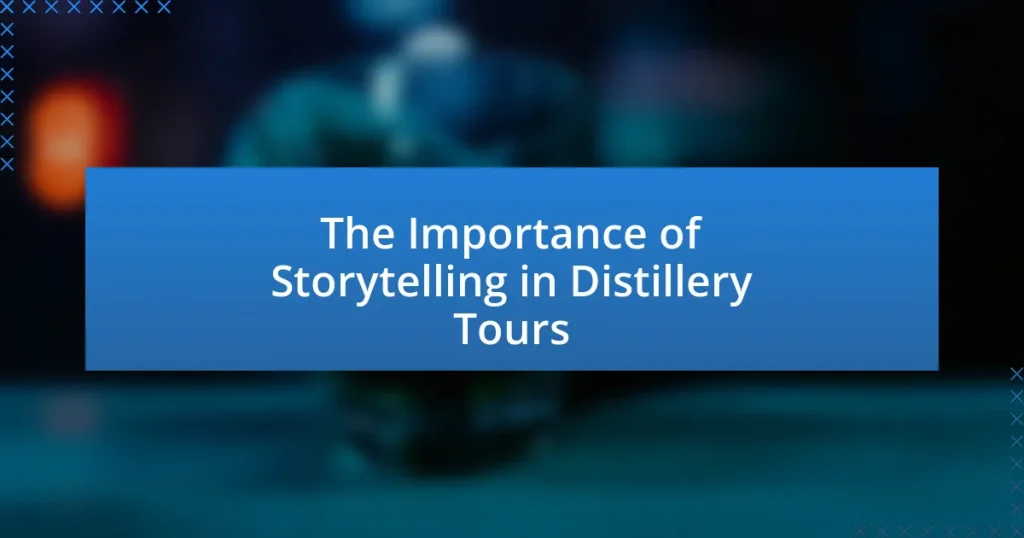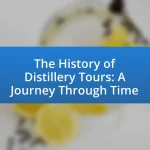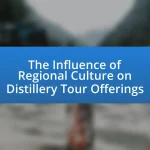The article focuses on the significance of storytelling in distillery tours, emphasizing its role in enhancing visitor engagement and creating memorable experiences. It outlines how effective narratives convey a distillery’s history, craftsmanship, and cultural significance, fostering emotional connections that lead to increased brand loyalty. Key elements of successful storytelling, such as relatable characters and immersive settings, are discussed, along with techniques for distillers to craft compelling narratives. The article also highlights the impact of storytelling on consumer retention, brand perception, and the overall visitor experience, providing insights into best practices and common pitfalls to avoid in storytelling approaches.
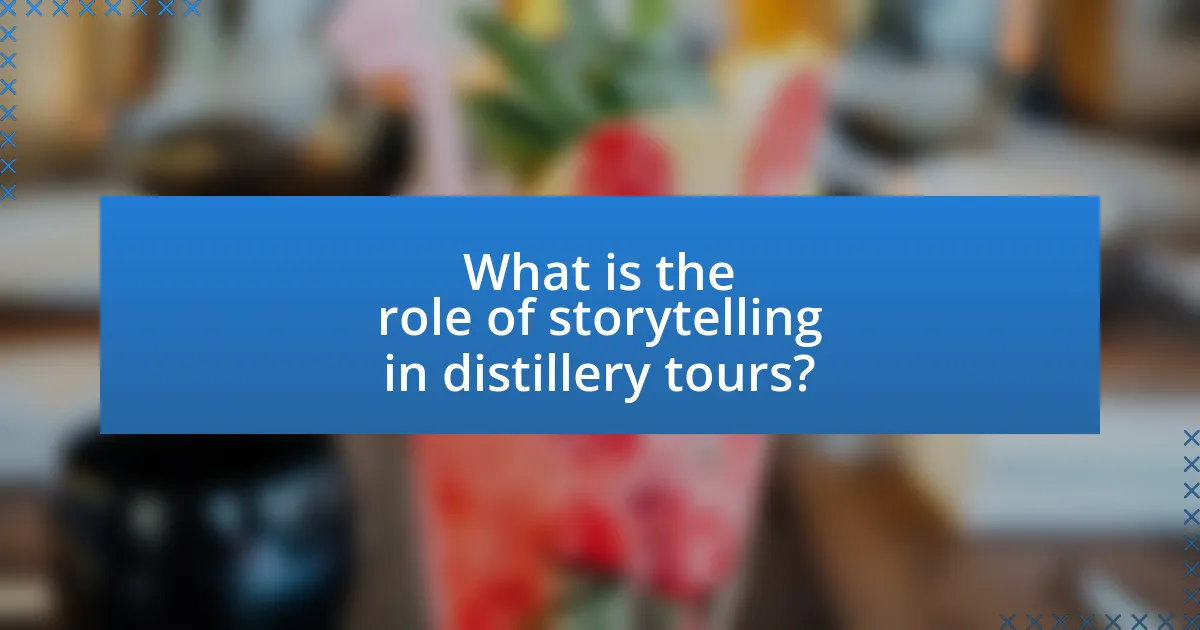
What is the role of storytelling in distillery tours?
Storytelling plays a crucial role in distillery tours by enhancing visitor engagement and creating a memorable experience. It allows distilleries to convey their unique history, production methods, and the cultural significance of their spirits, which fosters a deeper connection between the visitor and the brand. For instance, sharing anecdotes about the distillery’s founding or the craftsmanship behind a specific product can evoke emotions and stimulate interest, making the tour more than just a factual presentation. This narrative approach not only educates visitors but also helps in building brand loyalty, as consumers are more likely to support brands with compelling stories.
How does storytelling enhance the visitor experience during distillery tours?
Storytelling enhances the visitor experience during distillery tours by creating an emotional connection between the visitors and the brand. This connection is established through narratives that convey the history, craftsmanship, and unique characteristics of the distillery’s products. For example, sharing the story of the distillery’s founding, the challenges faced, and the traditions upheld can engage visitors on a personal level, making the experience memorable. Research indicates that emotional engagement significantly increases retention of information, with studies showing that stories can improve recall by up to 22 times compared to facts alone. Thus, storytelling not only enriches the tour but also fosters a deeper appreciation for the distillery’s offerings.
What elements of storytelling are most effective in engaging visitors?
The most effective elements of storytelling in engaging visitors include relatable characters, emotional connections, and immersive settings. Relatable characters allow visitors to see themselves in the narrative, fostering a personal connection. Emotional connections evoke feelings that resonate with the audience, making the experience memorable. Immersive settings transport visitors into the story, enhancing their engagement through sensory experiences. Research indicates that narratives incorporating these elements can increase retention and enjoyment, as evidenced by a study published in the Journal of Consumer Research, which found that stories with emotional content are more likely to be remembered and shared.
How does the narrative shape the perception of the distillery’s brand?
The narrative shapes the perception of the distillery’s brand by creating an emotional connection and enhancing brand identity. A compelling story about the distillery’s history, craftsmanship, and unique processes fosters a sense of authenticity and trust among consumers. For instance, distilleries that share their founding stories or highlight traditional methods often see increased customer loyalty and brand recognition, as evidenced by studies showing that brands with strong narratives can achieve up to 20% higher customer engagement. This emotional engagement not only differentiates the brand in a competitive market but also encourages word-of-mouth promotion, further solidifying its reputation.
Why is storytelling important for distillers and their products?
Storytelling is important for distillers and their products because it creates an emotional connection with consumers, enhancing brand loyalty and engagement. By sharing the history, craftsmanship, and unique characteristics of their spirits, distillers can differentiate their products in a competitive market. For instance, a distillery that narrates its heritage and the traditional methods used in production can evoke a sense of authenticity and trust. Research indicates that brands with compelling stories can increase customer retention by up to 55%, demonstrating the effectiveness of storytelling in fostering consumer relationships.
What impact does storytelling have on consumer connection to the product?
Storytelling significantly enhances consumer connection to a product by creating emotional engagement and relatability. When consumers hear a compelling narrative about a product, such as its origins, craftsmanship, or the people behind it, they are more likely to form a personal bond with that product. Research indicates that stories can increase brand recall by up to 22 times compared to facts alone, as demonstrated in a study by the Wharton School of Business. This emotional resonance fosters loyalty and encourages consumers to share their experiences, further amplifying the product’s reach and impact.
How can storytelling differentiate a distillery in a competitive market?
Storytelling can differentiate a distillery in a competitive market by creating a unique brand identity that resonates emotionally with consumers. This emotional connection fosters loyalty and enhances customer experience, making the distillery memorable. For instance, distilleries that share their history, production methods, and the passion behind their craft can engage customers more effectively than those that focus solely on product features. Research indicates that brands with compelling narratives can increase customer engagement by up to 30%, demonstrating the tangible benefits of storytelling in marketing strategies.
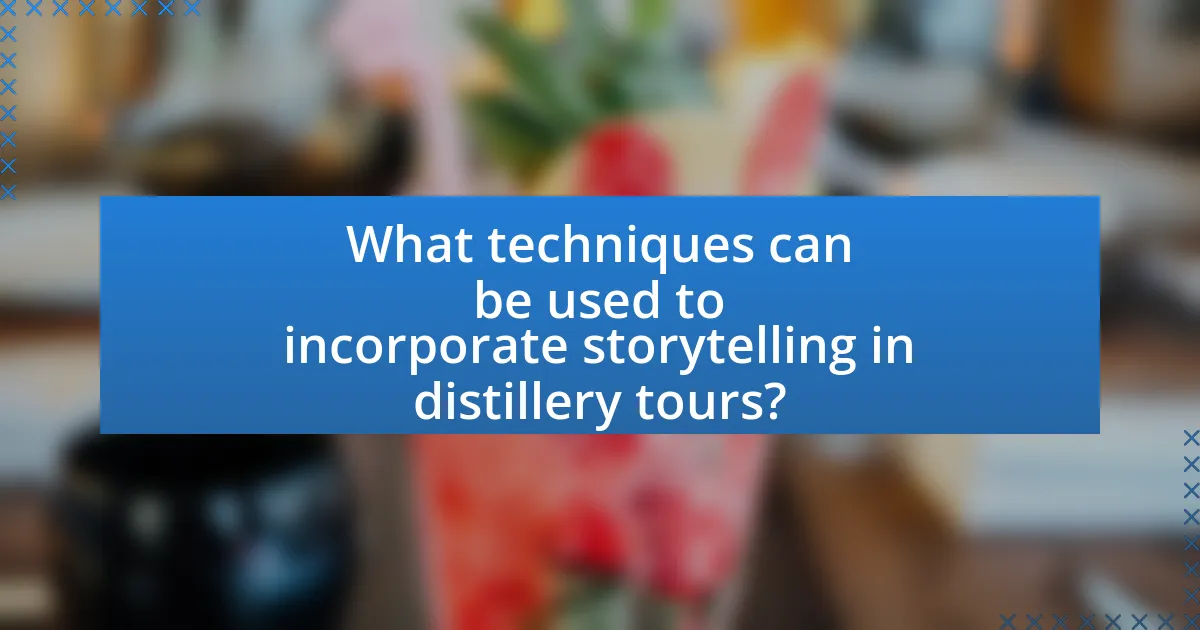
What techniques can be used to incorporate storytelling in distillery tours?
Techniques to incorporate storytelling in distillery tours include using personal anecdotes, historical context, and sensory experiences. Personal anecdotes from the distillers or staff create a connection with visitors, making the experience more relatable. Historical context, such as the origins of the distillery or the evolution of its production methods, provides depth and engages visitors’ curiosity. Sensory experiences, like tasting samples while hearing the story behind each product, enhance emotional engagement and retention of information. These techniques effectively transform a standard tour into an immersive narrative experience, fostering a deeper appreciation for the craft and its heritage.
How can distillers craft compelling narratives for their tours?
Distillers can craft compelling narratives for their tours by integrating the history of their distillery, the unique characteristics of their products, and personal anecdotes from the distillation process. This approach engages visitors by providing context and emotional connections to the brand. For instance, sharing the founding story of the distillery, including challenges faced and milestones achieved, creates a relatable backdrop. Additionally, highlighting the craftsmanship involved in production, such as the sourcing of local ingredients or traditional methods, adds authenticity. Research indicates that storytelling enhances visitor experience and retention, making the tour memorable and impactful.
What are the key components of a successful distillery story?
A successful distillery story includes authenticity, heritage, craftsmanship, and connection to the community. Authenticity establishes trust and credibility, as consumers are drawn to genuine narratives about the distillery’s origins and values. Heritage highlights the historical significance and traditions behind the distillation process, often showcasing unique recipes or methods passed down through generations. Craftsmanship emphasizes the skill and artistry involved in creating the spirits, which can be illustrated through detailed descriptions of the production process and the quality of ingredients used. Lastly, a connection to the community fosters a sense of belonging and loyalty, as distilleries that engage with local culture and initiatives resonate more deeply with visitors. These components collectively enhance the storytelling experience, making it memorable and impactful for guests.
How can personal anecdotes enhance the storytelling experience?
Personal anecdotes enhance the storytelling experience by creating emotional connections between the storyteller and the audience. These personal stories provide authenticity and relatability, making the narrative more engaging. Research indicates that stories incorporating personal experiences can increase listener retention by up to 65%, as they evoke empathy and foster a sense of shared experience. In the context of distillery tours, sharing personal anecdotes about the distillation process or memorable moments related to the craft can deepen visitors’ appreciation and understanding of the product, ultimately enriching their overall experience.
What role does the tour guide play in storytelling during distillery tours?
The tour guide plays a crucial role in storytelling during distillery tours by serving as the primary narrator who conveys the history, processes, and cultural significance of the distillery’s products. This storytelling enhances visitor engagement and understanding, making the experience memorable. For instance, a skilled tour guide can share anecdotes about the distillation process, the origins of specific recipes, or the impact of local traditions on the distillery’s offerings, thereby creating a narrative that connects visitors emotionally to the brand. Research indicates that effective storytelling can increase visitor retention of information by up to 70%, highlighting the tour guide’s importance in delivering a compelling narrative that enriches the overall tour experience.
How can guides effectively convey the distillery’s story to visitors?
Guides can effectively convey the distillery’s story to visitors by using engaging narratives that highlight the distillery’s history, production methods, and unique characteristics. This approach allows guides to create a personal connection with visitors, making the experience memorable. For instance, sharing anecdotes about the distillery’s founding, such as the year it was established or significant challenges it overcame, can enhance the storytelling. Additionally, incorporating sensory experiences, like allowing visitors to taste different spirits while explaining their origins, reinforces the narrative and deepens understanding. Research indicates that storytelling in tours increases visitor satisfaction and retention of information, making it a crucial element in distillery tours.
What training or skills are necessary for guides to tell stories effectively?
Guides need strong communication skills, knowledge of the subject matter, and storytelling techniques to tell stories effectively. Effective communication allows guides to engage their audience, while in-depth knowledge of distillation processes and the history of the distillery provides authenticity and credibility. Storytelling techniques, such as using vivid imagery and emotional connections, enhance the narrative and make it memorable. Research indicates that guides who employ these skills can significantly improve visitor satisfaction and retention of information, as evidenced by a study published in the Journal of Tourism Research, which found that storytelling enhances the overall experience in cultural tourism settings.
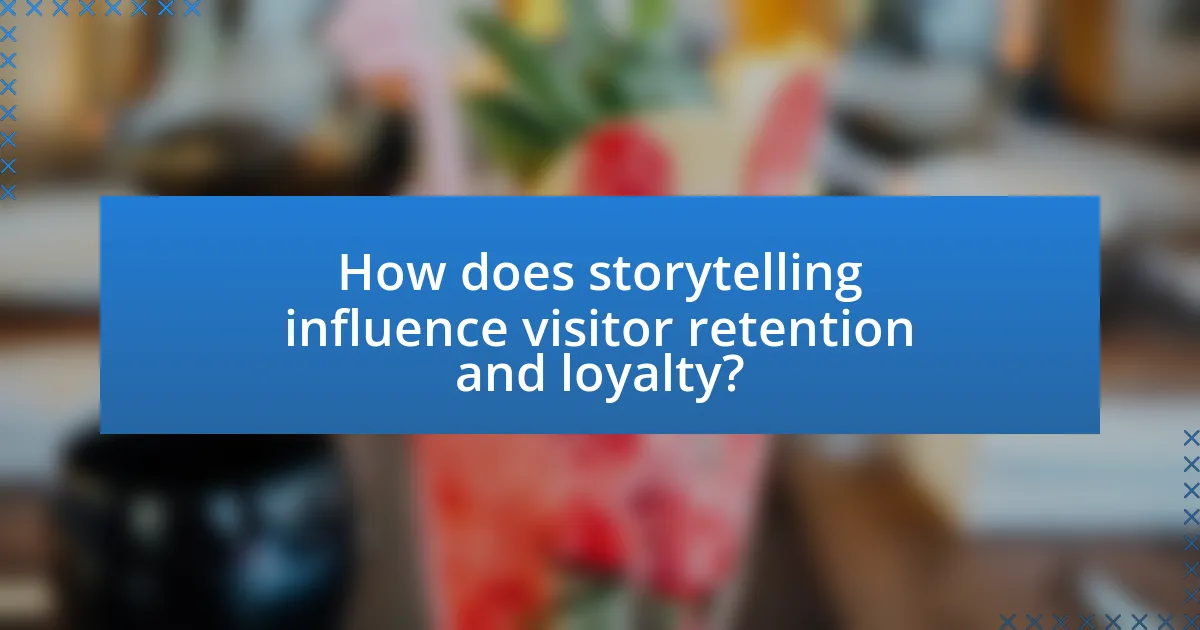
How does storytelling influence visitor retention and loyalty?
Storytelling significantly enhances visitor retention and loyalty by creating emotional connections and memorable experiences. When distilleries share compelling narratives about their history, production processes, and the people behind the brand, visitors are more likely to engage deeply with the experience. Research indicates that emotional storytelling can increase customer loyalty by up to 55%, as it fosters a sense of belonging and attachment to the brand. This connection encourages repeat visits and positive word-of-mouth, ultimately leading to sustained customer loyalty.
What are the long-term benefits of storytelling for distilleries?
Storytelling provides long-term benefits for distilleries by enhancing brand identity and fostering customer loyalty. By sharing narratives about their heritage, production processes, and unique characteristics, distilleries create emotional connections with consumers. This emotional engagement can lead to increased brand recognition and differentiation in a competitive market. Research indicates that brands with compelling stories can achieve up to 20% higher sales compared to those without, demonstrating the effectiveness of storytelling in driving consumer behavior. Additionally, storytelling can enhance the overall visitor experience during distillery tours, encouraging repeat visits and word-of-mouth referrals, which are crucial for sustained growth.
How does a memorable story impact repeat visits to a distillery?
A memorable story significantly enhances the likelihood of repeat visits to a distillery by creating an emotional connection with visitors. This connection fosters loyalty and encourages individuals to return, as they associate the distillery experience with a unique narrative that resonates with them. Research indicates that storytelling can increase customer engagement and retention; for instance, a study published in the Journal of Marketing found that narratives can improve recall and emotional response, leading to stronger brand attachment. Therefore, when a distillery effectively communicates its history, production methods, or unique anecdotes, it not only captivates visitors but also motivates them to revisit, reinforcing the importance of storytelling in distillery tours.
What strategies can distilleries use to maintain engagement after the tour?
Distilleries can maintain engagement after the tour by implementing follow-up communication strategies, such as personalized emails and social media interactions. Personalized emails can include thank-you notes, exclusive offers, or information about upcoming events, which fosters a sense of connection and encourages repeat visits. Social media interactions, including sharing user-generated content and responding to comments, keep the distillery in the minds of visitors and create a community around the brand. According to a study by the Content Marketing Institute, 70% of consumers prefer to learn about a company through articles rather than ads, highlighting the effectiveness of storytelling in maintaining engagement.
What best practices should distilleries follow for effective storytelling?
Distilleries should focus on authenticity, emotional connection, and engaging narratives for effective storytelling. Authenticity ensures that the stories reflect the true heritage and craftsmanship of the distillery, which builds trust with the audience. Emotional connection can be achieved by sharing personal anecdotes or the journey of the distillery, making the experience relatable and memorable. Engaging narratives involve using vivid imagery and sensory details to immerse visitors in the story, enhancing their overall experience. For instance, a study by the Journal of Business Research highlights that storytelling can significantly increase customer engagement and brand loyalty, demonstrating the effectiveness of these practices in distillery tours.
How can distilleries measure the effectiveness of their storytelling efforts?
Distilleries can measure the effectiveness of their storytelling efforts through customer feedback, engagement metrics, and sales data. Customer feedback can be collected via surveys and reviews, allowing distilleries to assess how well their narratives resonate with visitors. Engagement metrics, such as social media shares and comments, provide insight into how compelling the stories are to the audience. Additionally, analyzing sales data before and after implementing storytelling strategies can reveal the impact on consumer purchasing behavior, indicating the effectiveness of the storytelling in enhancing brand connection and driving sales.
What common pitfalls should distilleries avoid in their storytelling approach?
Distilleries should avoid oversimplifying their narratives, as this can lead to a lack of authenticity and depth. When distilleries present their stories in a superficial manner, they risk alienating consumers who seek genuine connections with brands. For instance, a study by the Journal of Business Research found that consumers are more likely to engage with brands that share detailed and relatable stories, enhancing brand loyalty. Additionally, distilleries should steer clear of using jargon or overly technical language, which can confuse visitors and detract from the experience. Clear and accessible storytelling fosters better understanding and appreciation of the distillery’s craft.
